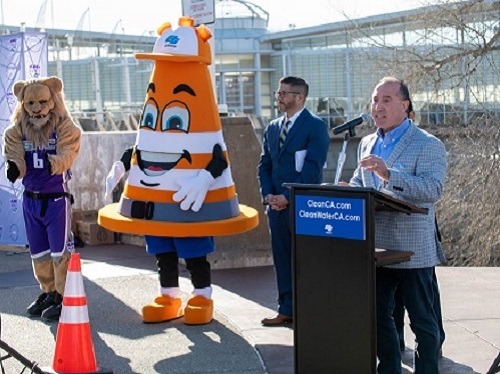The Sacramento Kings basketball team, the California Department of Transportation, and more than 35 volunteers recently joined forces to collect and remove litter from Robert T. Matsui Park along the Sacramento River.
[Above photo by Caltrans]
In a statement, Caltrans Director Tony Tavares explained that this cleanup event highlighted how trash and debris pollute Sacramento waterways, including through storm water flows. The event collected and removed more than 500 pounds of trash from the park, which included things such as broken glass, cigarettes, plastic bottles, and cans, he said.
“Sacramento is known as the River City, and residents and tourists love to visit and enjoy our rivers,” Tavares pointed out. “But these fragile waterways and public spaces need to be protected, so everyone needs to work together to keep our waters clean and litter-free.”
Caltrans noted that recent storms put a spotlight on the threat of storm water pollution in the Sacramento region and statewide as well. The agency said storm water can pick up a variety of pollutants, including trash, litter, and bacteria, flushing it down storm drains that flow to local lakes, rivers and streams.
State departments of transportation across the country are engaged in a variety of efforts to not only remove litter from waterways but manage storm water flows as well.
For example, in September 2022, the Tennessee Department of Transportation began expanding upon its traditional role in the Mississippi River Delta Region from building and maintaining roads to include fighting litter, supporting tourism, and promoting economic development.
The agency is doing so through the Tennessee Delta Alliance or TDA, a partnership between Tennessee DOT and the University of Memphis.
That alliance also established a regional, water-based Keep America Beautiful affiliate along Tennessee’s portion of the Great River Road National Scenic Byway.
Additionally, in March 2022, Tennessee DOT teamed up with Keep the Tennessee River Beautiful and other partners to establish a network of 17 “Seabin” automated litter and debris removal devices across the Tennessee River watershed. In related move, in April 2021, the agency provided the Tennessee Aquarium grants to establish two new exhibits illustrating how microplastics and other roadside trash can negatively affect the health of the ocean as well as rivers, lakes, and streams.

